
September 21
1867 Birth: Henry Stimson:
As President Truman's senior adviser on military use of atomic energy, Henry L. Stimson made the deciding recommendation to drop the first atomic bomb, one of the most significant events in the history of mankind.
In addition to this great responsibility, Mr. Stimson assumed heavy burdens as President Hoover's Secretary of State (1929-1933) and again as Secretary of War in the cabinets of President Franklin D. Roosevelt and President Truman (1940-1945). His unusually long period of public life which established him as an elder statesman in the American scene included an earlier period (1911-1913) as President Taft's Secretary of War, then a relatively minor post.
When he was in his late seventies Mr. Stimson was the civilian administrative head of a victorious army of more than 10,000,000, the largest ever raised by the United States. It was in this post that he was largely responsible for bringing to an abrupt end over Hiroshima and Nagasaki the violence that had frustrated his diplomacy in the Nineteen Thirties when he was President Hoover's Secretary of State. Mr. Stimson later disclosed that he had not hesitated in recommending to the recently sworn in President Truman the first use of the atomic bomb. [For further information, click here.]
1898 China: The Hundred Days' Reform was abruptly terminated when Empress Dowager Cixi forced the reform-minded Guangxu Emperor into seclusion and took over the government as regent. [For further details, Click here.]
1914 List Regiment (Sep 1-Oct 7):
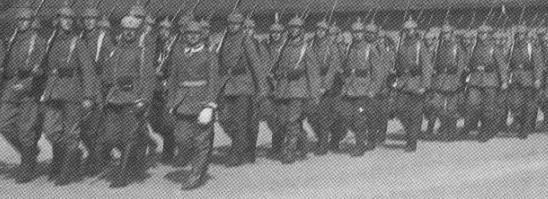
Infantry Recruit Adolf Hitler's regiment continues a short but intensive basic training program, which is held in the premises of a large public school on the Elizabeth Platz in Munich. Hitler receives the first uniform of his life; basic greenish-grey with an "RIR 16" sown in red unto the epaulettes and a red stripe down the side of the trousers. The trousers are tucked into new leather boots, topped by a thick leather belt around the waist of the uniform jacket. [For further details, Click here.]
1915 World War I: List Regiment:
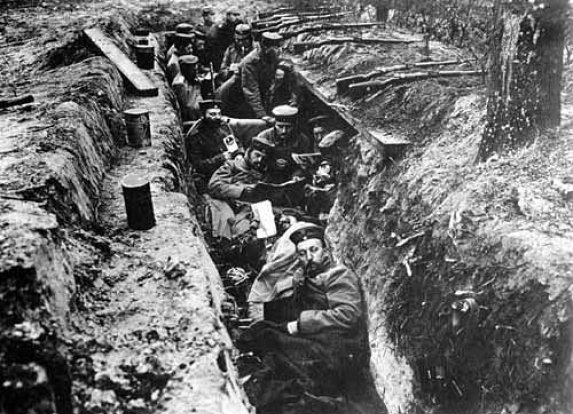
Gefreiter Adolf Hitler's 16 Reserve Infantry Regiment continues to occupy a position at Fromelles, on a level field with water channels, willow trees and willow stalks. In the distance towards the enemy lines lies an insignificant wood with barbed wire entanglements. Under the direction of their defense-minded commander, Lieutenant General Gustav Scanzoni von Lichtenfels, the regiment works ceaselessly day and night to further fortify their position at Fromelles while fighting off repeated assaults by the enemy. [For further details, Click here.]
1916 World War I: List Regiment:
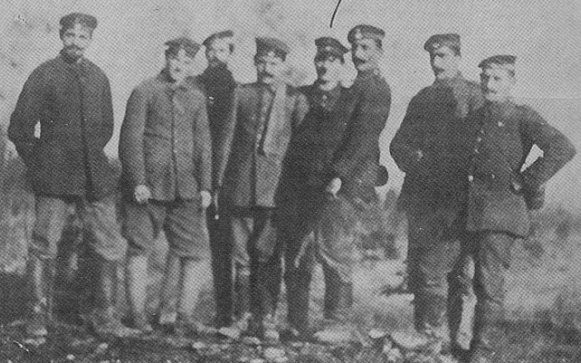
Hitler and his fellow dispatch runners
Gefreiter Adolf Hitler endures trench warfare in Flanders (Artois) with 3 Company, 16 Reserve Infantry Regiment [List Regiment]. [For further details, Click here.]
1917 World War I: Various:
Central Powers respond to Papal Peace Note:
On this day in 1917, Austria-Hungary and Germany make separate replies to the proposal issued by Pope Benedict XV at the beginning of the previous month calling for an immediate armistice between the Allied and Central Powers in World War I.
Since being named to the papacy in early September 1914, Benedict had been a consistent advocate for peace. His idea for a general Christmas truce had been dismissed by the leadership of the warring powers—though spontaneous breaks in fighting and celebrations of the holiday, initiated by the soldiers themselves, had in fact occurred in many areas along the lines on Christmas Day 1914. Even after Italy entered the war on the Allied side, declaring war on Austria-Hungary in May 1915, the Vatican continued its efforts to promote peace. In a seven-point peace proposal issued on August 1, 1917, and addressed to "the heads of the belligerent peoples," Pope Benedict called for the cessation of hostilities, general reduction of armaments, freedom of the seas and international arbitration of any territorial questions among the warring nations.
Unfortunately for Benedict, none of the belligerent nations were inclined to accept a peace along the lines that he had suggested. In fact, Germany and the Allies both saw the Vatican as prejudiced toward the other, and neither was at that point prepared to accept anything less than a complete victory. According to one Allied leader, U.S. President Woodrow Wilson, German intransigence had made peace along the lines suggested by the pope—a return to the status quo, in Wilson's eyes—utterly impossible. The object of the war, Wilson stated in his reply to the Vatican on August 27, 1917, was now to "deliver the free peoples of the world from the menace and the actual power of a vast military establishment controlled by an irresponsible Government."
The one exception to the general rejection of the Papal Peace Note of August 1917 was Austria-Hungary, who issued its own reply on September 21, concluding that: "Guided by a spirit of moderation and consideration, we see in the proposals of your Holiness a suitable basis for initiating negotiations with a view to preparing a peace, just to all and lasting, and we earnestly hope our present enemies may be animated by the same ideals." That same day, however, Austria's more powerful ally, Germany, expressed its own inability to accept peace based on Benedict's terms. Even after an armistice ended the war on November 11, 1918, the Vatican found itself on the outside, as its requests to be included in the peace negotiations were denied and it was excluded from the Paris Peace Conference at Versailles in 1919. (History.com)
List Regiment (September 11-30):
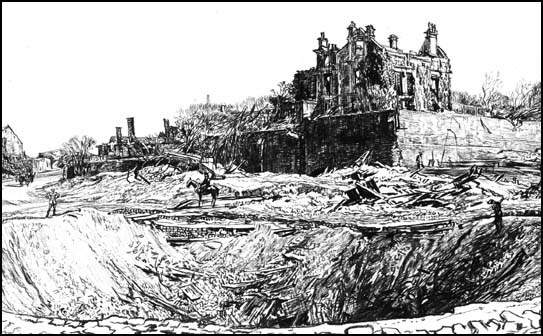
The regiment remains on light duty, guarding a camp near Mulhouse in Alsace, the only section of the front on German soil. During this slow time, not only will Hitler and his comrades get a well-deserved respite from the rigors of trench warfare, but the heavily censored news from the Front seems to be improving as well. The news of the collapse of the Russian Front and the further defeats of Italian arms is, however, tempered by the news that German munitions workers have gone on strike. This mix of events give an impression that the war on the Front is going well, but being undermined by defeatism on the home front. [For further details, Click here.]
1918 World War I: Various:
Palestine: British cavalry sweeps through Nazareth and turns east to reach the Jordan just south of the Sea of Galilee.
List Regiment (August 21-September 27):
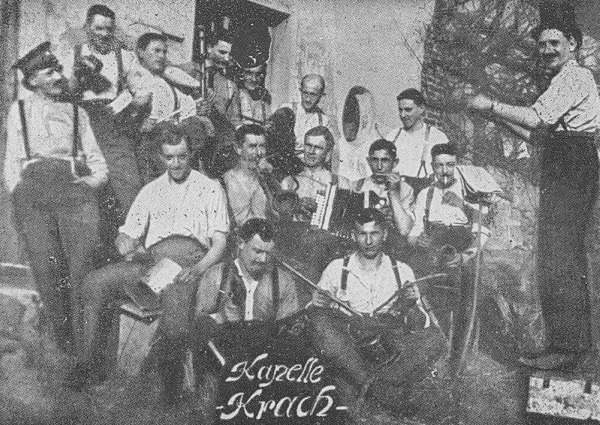
Gefreiter Adolf Hitler attends a signals training course in Nuremberg. [For further details, Click here.]
1922 Zionism:

President Warren G. Harding signs a joint resolution of approval to establish a Jewish homeland in Palestine.
1929 Skirmishes between China and the Soviet Union occur along the Manchurian border.
1930 Weimar: The Nazis have just won their first major electoral success, winning 107 seats in the national Reichstag elections. The victory takes even the Nazis by surprise.
From an essay by Goebbels in Der Angriff:
Our duty is to transform the miracle of this political mystery into reality. The broad masses who have expressed themselves in our movement have given a clear and unmistakable statement against the Germany of today and for the Germany of tomorrow. They want a radical break with the domestic, foreign, economic, and cultural policies of the past government. No more threatening assault on the System can be imagined. It is clear that the will to rid Germany of the old parties and their ideas is no longer that of a small party, but of an entire awakened nation. Our propaganda has unleashed this popular will. Now we must transform words into deeds. [For further details, Click here.]
1931 Finance: Britain goes off the gold standard.
1933 Church and Reich:
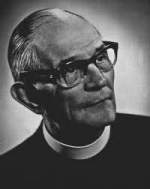
Martin Niemoeller begins organizing the Pastors' Emergency League. Over 7,000 churches will join, although some 2,500 later withdraw under Nazi pressure. The League itself will give birth to the more famous Barmen Synod, which will be formed in May 1934.
1935 Hitler's speech to the Hitler Youth in Nuremberg:

What we want of our German youth is different to what was wanted in the past. In our eyes the German youth of the future must be slim and trim, swift as a greyhound, tough as leather and hard as Krupp steel. We have to educate a new type of person so that our People are not destroyed by the symptoms of the degeneration of our time. We do not waste words, we act. We have begun to educate our People in a new school, to provide them with an education which begins in youth and is never-ending. In future a young man will be transferred from one school to the next. Schooling will begin with the child and will end with the old veteran of the movement. No one shall say that for him there is a time when he can be left entirely to his own devices. It is the duty of each of us to serve his People, it is the duty of each of us to prepare himself for this service, to toughen his body and to prepare and strengthen his mind. [For further details, Click here.]
1936 Various:
Military maneuvers: largest since 1914 held in Germany.
Antisemitism: UK: Arthur Leese and two other British Fascists are found guilty of libeling and slandering British Jews.
1938 Sudeten Crisis: The Czech government agrees to Anglo-French plans to cede the Sudetenland to Germany.
1939 Various:
Romanian Legionaries murder Armand Calinescu, whom they blame for the death of Corneliu Codreanu: Nine of the assassins turn themselves in to police and all are quickly executed:
He was a staunch ally of France and Britain and a steadfast adversary of the Nazi agents in Romania. Becoming Interior Minister in March 1938, he prepared himself for the confrontation with the Iron Guard. In November 1938, Calinescu decapitated that organization by killing their leaders in prison. In 1939, after brief stints as Minister of Health and Minister of Education, on March 7 he became Prime Minister of Romania, being considered the man of steel able to prevent Iron Guard political violence and to keep Romania out of pro-Nazi war camp. In September 1939, after the invasion of Poland, the pro-Nazi members of Iron Guard alleged that he and the king Carol II planned with the British Intelligence to blow up Prahova oil fields, preventing Germany to take control and use them. He was assassinated in Bucharest on 21 September 1939 by Iron Guard members under the direct leadership of Horia Sima, and it seems that his assassins were sent by Germany. [For further details, Click here.]
Press Reaction to Hitler's September 19 Speech:In his speech in Danzig, M. Hitler, a prisoner of his own crimes, merely argued in his own defense against the evidence, merely dealt in falsehoods in order to conceal from the eyes of his people the tragic aspects of the situation created by the German resort to force, to conceal inescapable realities. He repeated for the hundredth time his charges against the 'Diktat' of Versailles . . . . M. Hitler limited himself to proclaiming that he has no war aims in regard to France and England. What was noteworthy about the Danzig speech was that he made no really constructive proposals, and that he did not explain the circumstances and the conditions of the collusion between Germany and Russia. (Le Temps)
FDR urges repeal of Neutrality Act embargo provisions:

On this day in 1939, President Franklin Delano Roosevelt appears before Congress and asks that the Neutrality Acts, a series of laws passed earlier in the decade, be amended. Roosevelt hoped to lift an embargo against sending military aid to countries in Europe facing the onslaught of Nazi aggression during World War II.
In 1936 and 1937, the Neutrality Acts had been expanded to restrict the sale of arms and war materials during a period of isolationist sentiment. However, in 1939, the rising threat to democracy in Western Europe--and pro-democratic forces in China--spurred Roosevelt to ease these restrictions. FDR warned Congress that Europe was on the verge of descending into a second global conflict. During the address, Roosevelt described how countries such as Germany built up "vast armies and navies and storehouses of war...with growing speed and intensity," while the U.S. had tried to remain neutral doing "all in its power to encourage peaceful settlements." However, by 1939, Roosevelt had begun to weigh the benefits of American neutrality against the nation's obligation to help democratic nations defend themselves against fascist, expansionist Germany and Italy. In his speech before Congress, Roosevelt said that American neutrality laws as they stood in 1939 may actually give passive "aid to an aggressor" while denying help to victimized nations.
Although the language of the proposed amendment technically stated that any country would be allowed to purchase arms and goods from a still neutral U.S., Roosevelt's primary goal was to make it easier for the U.S. to supply arms to democratic Britain and France. The new provision prohibited American ships from transporting arms or war material, gave the president power to identify combat zones (primarily Atlantic sea lanes) from which American citizens would be restricted and made it illegal for U.S. citizens to travel on vessels from belligerent nations.
Congress finally agreed to the proposed changes on November 4, 1939. A year later, with Britain standing as the last bastion against Nazi aggression in Europe and with German U-boats threatening American shipping, the Neutrality Act was again amended to allow the arming of merchant vessels. In December 1941, the act was rendered moot by the bombing of Pearl Harbor and America's subsequent entry into World War II. (History.com)
Poland: Remainder of the Polish Southern Army surrender at Zamosz and Tomaszov (60,000 prisoners).Holocaust: Poland: The Germans decree that all Polish communities with less than 500 Jews are to be dissolved and that the Jews are hereafter to live in certain restricted areas in the larger cities, or in a special region between Lublin and Nisko, called the 'Lublinland Reservation.' (THP)
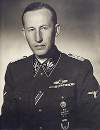
Holocaust: Final Solution: Reinhard Heydrich tells a meeting of his department heads in the Reich Central Security Office (RSHA), an organization encompassing the Gestapo, SS, SD, and Criminal Police, that the mass deportations of thousands of Jews, including Poles, Germans, Austrians, Czechs and Slovaks, to the eastern areas of Poland are the 'first steps in the final solution' (die Endloesung). (THP)
Church and Reich: Cardinal August Hlond, Primate of Poland, arrives in Rome and personally reports of German atrocities against Catholic priests in Poland to the Pope. The Vatican radio and L'Osservatore Romano tell the story to the world. (THP)
1941 World War II: Barbarossa: The German Army cuts off the Crimean Peninsula from the rest of the Soviet Union.
1942 Various: From Speer's notes of a conference with Hitler:
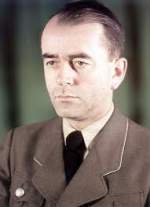
I pointed out to the Fuehrer that, apart from an insignificant amount of work, no possibility exists of organizing armament production in the concentration camps, because: (1) the machine tools required are missing; (2) there are no suitable premises. Both these assets would be available in the armament industry, if use could be made of them by a second shift. The Fuehrer agrees to my proposal that the numerous factories set up outside towns for reasons of air raid protection should release their workers to supplement the second shift in town factories and should in return be supplied with labor from the concentration camps-also two shifts. I pointed out to the Fuehrer the difficulties which I expect to encounter if Reichsfuehrer SS Himmler should be able, as he requests, to exercise authoritative influence over these factories. The Fuehrer, too, does not consider such an influence necessary.
The Fuehrer, however, agrees that Reichsfuehrer SS Himmler should derive advantage from making his prisoners available; he should get equipment for his division. I suggest giving him a share in kind (war equipment) in ratio to the man-hours contributed by his prisoners. A 3 to 5 percent share is being discussed, the equipment also being calculated according to man-hours. The Fuehrer would agree to such a solution. The Fuehrer is prepared to order the additional allocation of this equipment and weapons to the SS, upon submission of a list.
The Superfortress takes flight:
On this day in 1942, the U.S. B-29 Superfortress makes its debut flight in Seattle, Washington. It was the largest bomber used in the war by any nation.
The B-29 was conceived in 1939 by Gen. Hap Arnold, who was afraid a German victory in Europe would mean the United States would be devoid of bases on the eastern side of the Atlantic from which to counterattack. A plane was needed that would travel faster, farther, and higher than any then available, so Boeing set to creating the four-engine heavy bomber. The plane was extraordinary, able to carry loads almost equal to its own weight at altitudes of 30,000 to 40,000 feet. It contained a pilot console in the rear of the plane, in the event the front pilot was knocked out of commission. It also sported the first radar bombing system of any U.S. bomber.
The Superfortress made its test run over the continental United States on September 21, but would not make its bombing-run debut until June 5, 1944, against Bangkok, in preparation for the Allied liberation of Burma from Japanese hands. A little more than a week later, the B-29 made its first run against the Japanese mainland. On June 14, 60 B-29s based in Chengtu, China, bombed an iron and steel works factory on Honshu Island. While the raid was less than successful, it proved to be a morale booster to Americans, who were now on the offensive.
Meanwhile, the Marianas Islands in the South Pacific were being recaptured by the United States, primarily to provide air bases for their new B-29s—a perfect position from which to strike the Japanese mainland on a consistent basis. Once the bases were ready, the B-29s were employed in a long series of bombing raids against Tokyo. Although capable of precision bombing at high altitudes, the Superfortresses began dropping incendiary devices from a mere 5,000 feet, firebombing the Japanese capital in an attempt to break the will of the Axis power. One raid, in March 1945, killed more than 80,000 people. But the most famous, or perhaps infamous, use of the B-29 would come in August, as it was the only plane capable of delivering a 10,000-pound bomb—the atomic bomb. The Enola Gay and the Bock's Car took off from the Marianas, on August 6 and 9, respectively, and flew into history. (History.com)
Burma: British forces attack the Japanese.War in the air: RAF raids on Munich and the Saar valley.
1943 World War II: The Red Army forces a crossing of the Dnepr at Dnepropetrovsk, breaking into the German defensive lines of the Panther-Stellung.
1944 Various:
Italy: British 8th Army captures Rimini.
Greece: German forces evacuate the Peloponnese peninsula.
Warsaw Uprising: Last drop for Warsaw. Of the 306 Allied aircraft that take part in all the drops, 41 are shot down and 200 airmen killed.
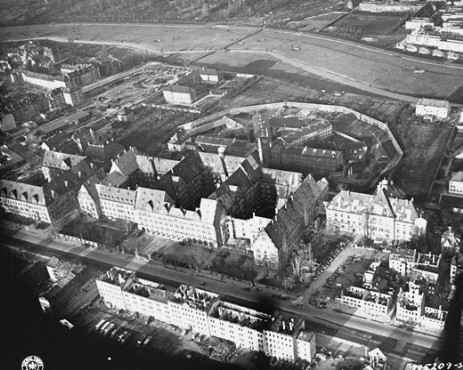
1946 Nuremberg Tribunal: The justices continue to meet to discuss verdicts in the Major War Criminals Trial. (See: 30 September 1946)
1949 New States:
Mao Zedong outlines the new Chinese government:
At the opening of the Chinese People's Political Consultative Conference in Peking, Mao Zedong announces that the new Chinese government will be "under the leadership of the Communist Party of China." [For further details, Click here.]
The Federal Republic of Germany: aka West Germany, is created under 3-power occupation.
Edited by Levi Bookin (Copy editor)
levi.bookin@gmail.com
Disclaimer: This site includes diverse and controversial materials--such as excerpts from the writings of racists and anti-Semites--so that its readers can learn the nature and extent of hate and anti-Semitic discourse. It is our sincere belief that only the informed citizen can prevail over the ignorance of Racialist "thought." Far from approving these writings, this site condemns racism in all of its forms and manifestations.
Fair Use Notice: This site may contain copyrighted material the use of which has not always been specifically authorized by the copyright owner. We are making such material available in our efforts to advance understanding of historical, political, human rights, economic, democracy, scientific, environmental, and social justice issues, etc. We believe this constitutes a "fair use" of any such copyrighted material as provided for in section 107 of the US Copyright Law. In accordance with Title 17 U.S.C. Section 107, the material on this site is distributed without profit to those who have expressed a prior interest in receiving the included information for research and educational purposes. If you wish to use copyrighted material from this site for purposes of your own that go beyond 'fair use', you must obtain permission from the copyright owner.
Please Note: The list-owner and moderators of 3rdReichStudies are not responsible for, and do not necessarily approve of, the random ads placed on our pages by our web server. They are, unfortunately, the price one pays for a 'free' website.